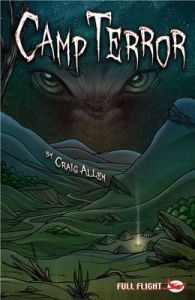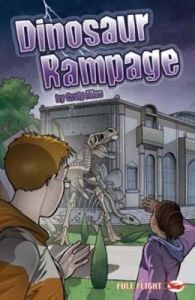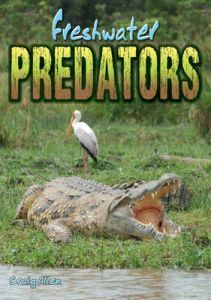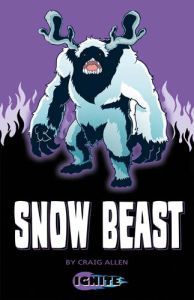Craig Allen
As a child I hated reading. It wasn't until my early twenties that I realised the importance of reading from an educational side. I also never realised how fun reading could be! I sit most nights with my daughter who is four years old, and just started school, and read her books with her. (At the grand old age of 30 I have just been diagnosed with Dyslexia - crazy! That explains a little on why I hated reading as a child so much).
I feel privileged to be able to write for Badger Learning as their books are designed for young people who were just like me. If I can help students find enjoyment in reading then I will be satisfied that I have done my job correctly.On a personal front, I am a massive Newcastle United football fan and have travelled across Europe to see them play. My favourite stadium that I have visited has to be the San Siro where Newcastle drew 2-2 with Inter Milan – good times! I can't wait to take my daughter Kaitlin to her first game at Newcastle, hopefully we will win but I am not going to hold my breath! I work full time as an Assistant Year Leader at St Cuthbert's Catholic High School in Newcastle Upon Tyne which gives me a lot of day to day inspiration. The students are great and make me laugh which is what life is all about – having a smile on your face and getting on with it!
Q&A with Craig Allen
What inspired you to write for reluctant readers?
I find inspiration in writing for reluctant readers as I was one myself. Growing up I was a very active boy who played as much sport as possible. I wasn't one of those kids who sat in all day watching TV and playing computer games, instead I was out kicking a football, swinging a cricket bat or spinning a fishing rod. I didn't voluntarily read a book until my early twenties and have been reading ever since. I remember my mum bringing me large books and asking me to give them a go but I would always be put off by the size. This is why I enjoy writing the short stories for Badger Learning to publish. Combined with the illustrations, the books would have appealed more to me if I had been given them from my mum instead of some of the thick novels.
What challenges do struggling readers face when they open a book?
Until I reached my early twenties I hated reading. Football, golf and fishing with mates always appealed to me more than sitting reading a book, even about the topics which I loved. Whenever I tried (and I did try, a little!) I looked at the cover, considered the thickness of the book and that was enough to put me off. Even the specialist books for reluctant readers at the time did not appeal as they looked like they were for very young children. That was the obstacle for me. So, 'what challenges do struggling readers face?' I believe it is about finding the right book at the right reading level. Even with the best of intentions, if the book concept doesn't appeal then a reluctant reader won't go past the front cover.
What I have found when working in schools is that some children are afraid to ask for help or to point out that they are struggling. This is a significant challenge that teachers and support staff must broach with their students; from the initial identification of students who need this extra support. If a child is reading a book which is too advanced for them then they will quickly lose interest. I think that this is very important for anyone, not just children. A person should read at their level to start with and get to grips with the basic; it is from this capability that enjoyment of reading can develop.
One difficulty when I tried to read was that I could never find anything which I could concentrate on. The school that I attended between 1995 and 2000 had a huge library with many books, unfortunately they were all a little 'too big' for me and so I couldn't sit down and finish a book in one go. Now that I have seen how publishers like Badger Learning have changed and adapted the modern book for reluctant and struggling readers, it gives me more hope for the less able reader. Being a less able reader is nothing to be ashamed of. I took the utmost that I could from my school experience and I still managed to go on and achieve many great things in life, but what is good now is that more books are specifically designed for people like you and me. This way by reading these types of books we are no longer at a disadvantage. Reading a small book from Badger Learning's Reluctant Reader series will only take about ten minutes. If a child can read a couple of these in a week then the benefits will be huge.
What is your favourite type of character to create?
When I create a character for one of my books I always try and base them on someone real. For example, Kaitlin in Dinosaur Rampage was modelled around my daughter. I aim to make the characters fun so that the reader can relate to what they are going through.
What features and methods do you use to ensure that your books have that High Interest appeal that really engages young readers?
As I found it difficult to engage with literature when I was at school myself, when I decided to write books for children it was a priority for me that they should appeal to everyone, not just advanced readers. As I predominantly write for boys, I wanted my books to be appealing with high-interest topics. I thought about topics which interested me when I was at school but also now and then tried to replicate my interests into the books. I did this as I always thought of myself as the average boy who enjoyed a good action or horror movie. I was also a very active youngster who loved participating in most sports. Animals, especially those that could kill a person, also intrigued me. This is how I came up with the basis of my books. Action, horror, sports and flesh-eating animals: what boy could resist?!
Now that my topics have been selected, I can start to plan my book. I love getting creative with my imagination but the type of book I am writing will depend on the methods used. For example; if I am writing a fiction book I will start with a small synopsis where I outline what the book will be about and what will happen. I come up with characters and write a brief plot about them. Characters are important because if the reader can't connect with them then they will quickly lose interest. Once the synopsis has been created along with the characters, I get to work.
Non-fiction books are slightly different. I am still getting creative when writing but 'facts' are important in these types of books so it is essential that I do my research. After I have chosen a topic I will go to the local library and start to read up on it. I will always write about something I am interested in, like football, cars or predatory animals. This way the research is fun. Once I have collected enough data I start to write up my book.
The physical writing of the book is only a third of the complete process, in my opinion. Yes the book has to be well written and must hit the target audience, but without the other two factors then a book will not reach its desired goal. This is especially true for my reluctant reader and non-fiction books. Both types of books are accompanied by illustrations (fiction) and photographs (non-fiction). Without these incorporated within the book, the reader may not engage as much as desired. So that's two parts out of three covered, so what is the third piece of the jigsaw which ensures that my books have that high interest appeal that really engages young readers? The answer is the team of employees working behind the scenes on my books. So many people are involved in the publication of a book and without their efforts then a book simply wouldn't work. Thank you!
What difference do books like these make to children who are in need of literacy support?
Whilst I am only thirty years old and left school fourteen years ago, so much has changed in schools since then. There is definitely more support for less able students in a whole host of areas of school life. I have had the pleasure of working full time in two different secondary schools (ages 11-18) and have witnessed the support which is provided. When I was at school I found reading and writing difficult. I did try but I always found myself in trouble with the teachers. My mum was always concerned but knew I wasn't a bad boy, I just struggled. She contacted the school and said that she thought I may be dyslexic. The school disagreed and told my mum that I needed to pay more attention in class. I'd like to clarify that I am not criticising my old secondary school but if they had taken the time to check, they would have found out that I was actually dyslexic. In September I will embark upon an experience that I never thought I would ever have the chance of achieving: MA Studies in Social Work. During the interview and written assessment, the university picked up that I may have dyslexia. After following that up it turned out that I did. It came as a shock to me: thirty years old, published author but dyslexic. I felt shocked but at the same time I felt reassured and confident when thinking about all that I have achieved in life to date without support.
Going forward I think that I now have a different outlook on life, including my approach to writing. When I look at the books that are published by Badger Learning it gets me thinking that if there had been more books like this when I was younger then maybe I wouldn't have been so shy when picking them up. I think that books like this are essential for young people growing up because not everyone is at the same level. The reluctant reader books which I create are short, action-packed and intense. A child can pick up one of these books and read it within ten minutes. It may not seem long but if a child was to do this each day then they would see the benefits within time! With the world changing fast it is necessary that both writers and publishers keep up with these changes. The books from Badger Learning definitely show that they are ahead of the game and that their sole purpose in publishing is to assist the readers who struggle with reading.
Can you give us any teasers of what to expect from Snow Beast?
Snow Beast was great fun to write. I love the snow and when I got the chance to go snowboarding last year I loved it. Being a sporty person I will try anything and won't be put off at how hard it may be to master. Snow Beast was originally planned last year after a trip to Austria where I went snowboarding and skiing on a school trip. When I was bombing down the slopes I used to think about how cool it would be if I was being chased by a snarling creature of some description down the slopes so expect something like this from my new book Snow Beast.
What are the major themes of your work?
I love reading horror books and so love writing them. When I sit down in front of my computer, no matter how hard I try to think of a story for another genre, I always end up writing a horror. Now when I read, I always look at books which have some form of scary creature in them. I love zombie books, vampire books and werewolf books. What I have learned through writing is that children love to be scared, so writing horrors is definitely the genre I can really sink my teeth into and get creative.
What controls do you place on the vocabulary you use and how important is this?
When writing a book for a reluctant reader it is important to ensure that the vocabulary is correct. There are different reasons why a child may be reluctant to pick up a book. It may be that they are interested in other activities or it may be that they have a learning difficulty of some description. Either way, when writing a book for a reluctant reader, it is important to stick to the series brief when writing. A brief will give the author an understanding of what the publisher wants to create: which age range the series is aimed at and the reading ability of those potential readers.
There is no point in writing a reluctant reader book for a child with a reading age of eight and adding vocabulary which is designed for an older child. If this was to happen then the reader will quickly become disengaged and the book would end up back on the shelf. Selecting the right vocabulary and terminology is very important. If I wanted to describe something in a book for a reluctant reader then I want to use words which the reader will understand. If I used vocabulary which is new to them and a little too advanced then they may not understand and therefore will not be able to engage with the plot or content whilst reading the book.
As a writer it is my goal to create a story which can be read by the desired target audience. Once I have written a story I generally print it off and sit in a quiet room and read over what I have created. I always have my red pen by my side, and as I read I have the series brief close to me. As I read I make notes and change sentences and words so that they read and flow better. After editing two or three times at least, and I am happy with my draft, I will send it in for the publisher to review.
What is your favourite children's book?
Sadly I did not have a favourite children's book growing up as I did not read. It is times like this that I really feel that I missed out on a magical part of life. My daughter who is now five years old has a favourite children's book which is The Gruffalo by Julia Donaldson. Whilst answering this question I feel saddened that I am unable to give you a book for me but we all make mistakes in life. The important thing is what we do now to make up for them I suppose.
Do you have any advice for aspiring writers/authors?
There is one piece of simple advice which I can give a young and aspiring author and that is DON'T GIVE UP! It took me two years of contacting agents and publishers before I got my lucky break. It would have been very easy to have given up then but I didn't. Hard work always pays off, keep calm and keep faith!
Speak to our team today on 01553 816082 or if you would prefer us to call you back then please enter your details in the form below and a member of our team will call you back.








